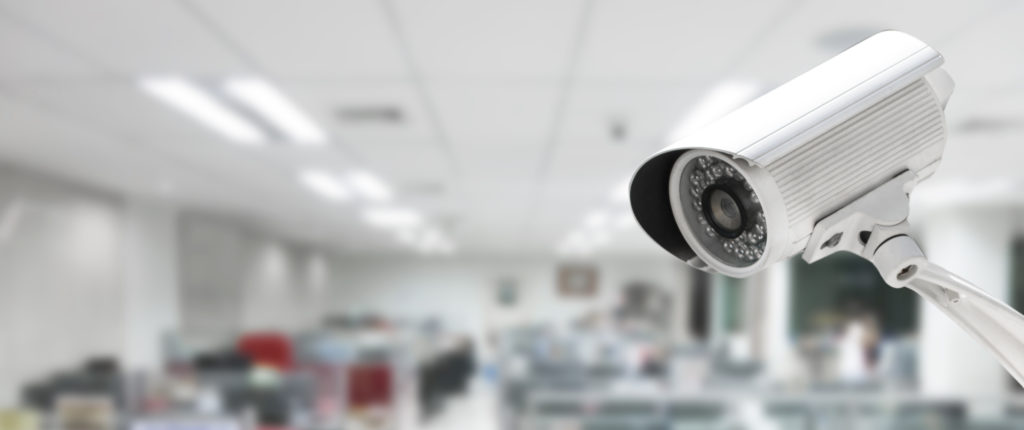
Thousands of employers install CCTV at their premises thinking that they can use the footage as they see fit to protect their business’, including using cctv evidence at a disciplinary hearing. However employment law and CCTV is not that straightforward, as we will see in the scenario below, there are things businesses need to have in mind.
Trouble at The Ramsay Arms
The Ramsay Arms has CCTV in the public areas, including the bar area. The CCTV system is visible but there are no signs in the area covered by the CCTV to bring a person’s attention to it. The entrance to the hotel has a sign confirming that CCTV is in use and states the purpose is for the protection of the residents. The only knowledge most employees have of the CCTV is the signs found at the entrance to the hotel.
The manager of the hotel, Jason, is approached by an employee, Kylie, who wishes to raise a grievance against her line manager, Harold. Kylie claims that Harold approached her at the end of her shift and swore at her for breaking a plate. Kylie claims that after berating her, Harold said “just get out of here” and pushed her. Harold is denying the incident entirely and claims that Kylie came to him upset about a breakage earlier in the evening and was rude to him. Harold says that he was tired and having tried to console Kylie he eventually just snapped at her to go home.
Employees caught on CCTV
Jason knows that if the incident occurred in the staff room to the side of the bar, as Kylie alleges it would have been caught on the bar’s CCTV. The footage is obtained and viewed by Jason. The footage supports Kylie’s claims and Jason decides he has seen enough. He invites Harold to a disciplinary hearing to be heard by Madge. Kylie is also invited to a disciplinary hearing as the footage shows she is not as innocent as she made out and was verbally abusive to Harold. The only evidence relied upon is the CCTV.
Harold and Kylie are in shock that the incident was recorded on CCTV and that Jason and Madge have viewed the footage for the purpose of watching the incident. Their complaints are ignored and Madge decides that based on what she saw in the footage, Harold should be dismissed for gross misconduct and Kylie should receive a first written warning.
Kylie resigns claiming her trust and confidence in The Ramsay Arms has been destroyed.
One month later The Ramsay Arms receives claims from both Harold and Kylie. The tribunal finds in favour of them both, finding that their dismissals were unfair, as the evidence relied upon was unlawful and the use of it broke Harold and Kylie’s rights. The damages are reduced for both Harold and Kylie due to their conduct contributing to their dismissal but The Ramsay Arms is left with its own legal bill and some damages to pay.
So where did it all go wrong?
The Ramsay Arms is entitled to monitor its employees but the risks associated with doing so are:
- breaches of data protection law;
- breaches of an employee’s human rights; and
- undermining an employee’s trust and confidence in their employer.
If the above risks aren’t addressed then the monitoring may be unlawful and could undermine the fairness of a dismissal, as happened in the scenario above. Failing to notify employees of monitoring that is taking place can cause issues with all of the above.
Under data protection laws employers are entitled to monitor employee activity but they need a lawful basis to do so and they need to communicate the monitoring appropriately to employees in advance.
The relationship of trust and confidence is a central aspect of all employment relationships and a breach of it can lead to a successful claim for constructive dismissal. As monitoring employees inevitably carried with it an element of intrusion, it’s not difficult to see how, if handled incorrectly, it could erode trust and confidence.
Employment law and CCTV
If an employee has a reasonable expectation of privacy then it can breach their human rights to monitor them. In the scenario above the CCTV was ostensibly in the bar but it caught the section of the staff room where the incident occurred. If Harold and Kylie believed that the staff room was an area for staff to relax on their breaks then they could argue that they had a reasonable expectation of privacy, especially if the CCTV was supposed to cover the bar area and was stated to be for the “protection of residents”.
In the scenario above The Ramsay Arms failed to carry out an assessment of the use of CCTV at the hotel and had failed to notify the employees of:
- their rights in relation to the use of CCTV and, in particular, the data gathered;
- the purpose of the CCTV i.e. what it could be used for;
- where it covered; and
- details of who would view the footage.
How could they have handled it better?
The Ramsay Arms should have:
- ensured, where possible, that the CCTV was targeted at areas of particular risk and confined to areas where expectations of privacy were low;
- informed their employees of the extent and nature of the CCTV and the reason for it;
- consulted with their employees about the use of CCTV;
- ensured that adequate notices were used to inform employees about the use of CCTV; and
- kept all of these arrangements under review.
The good news is that the risks above can be minimised by carrying out a full impact assessment and producing appropriate accompanying policies. Doing so will maximise the chances of the monitoring being lawful and an employer being able to rely on it to protect their business.
The above principles apply to all forms of monitoring. The value of having lawful monitoring is growing as more employers want to be able to protect their business using new and old technology. Employees are becoming more aware of their rights, so it is vital for employers to ensure those rights are not breached.
Our employment team has experience in advising on a wide variety of different types of monitoring including CCTV, vehicle tracking and drug and alcohol testing. If you want to discuss monitoring further or how we can support your business please contact our employment team on 01392 210700 or email employment@stephens-scown.co.uk.
